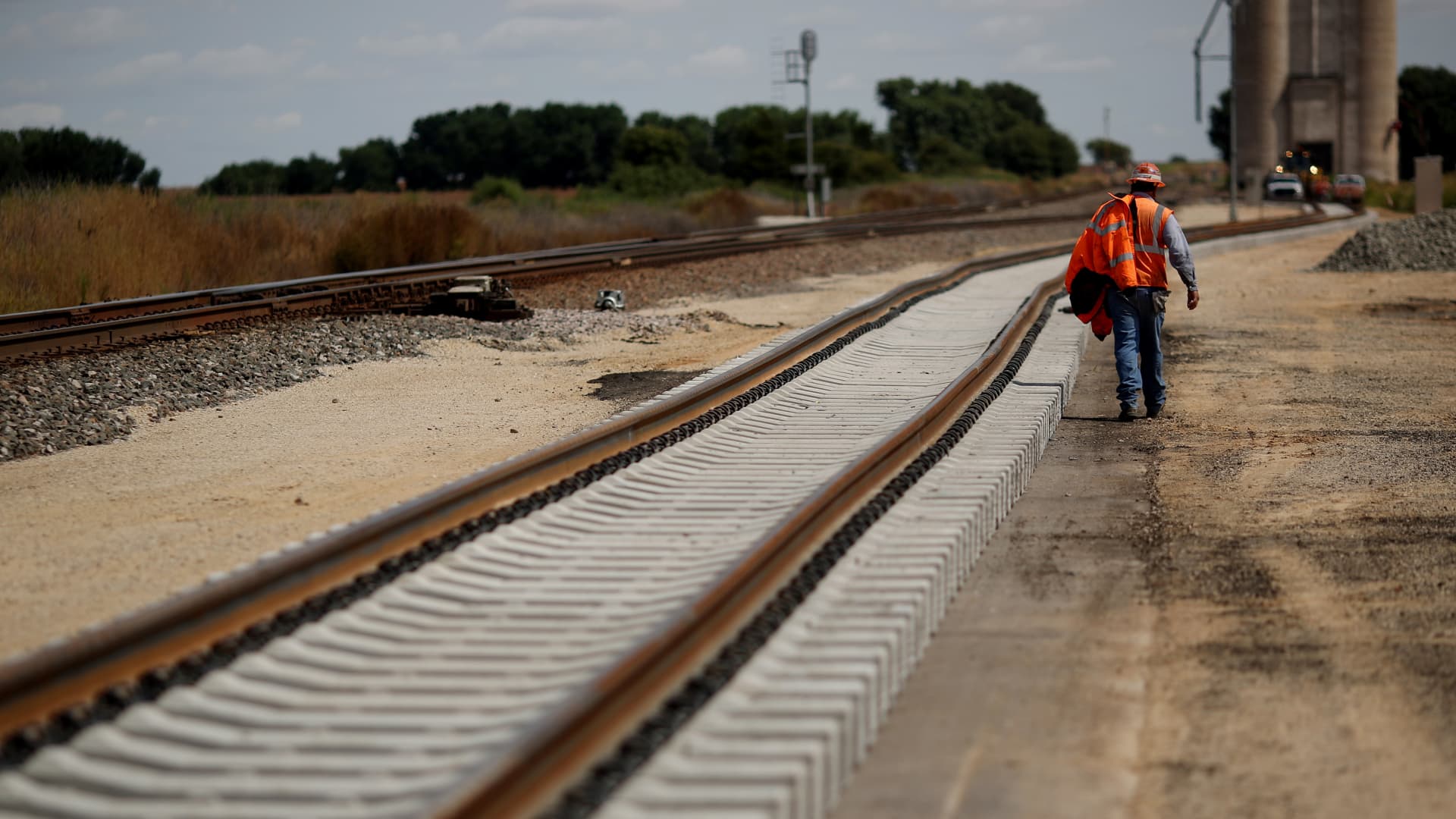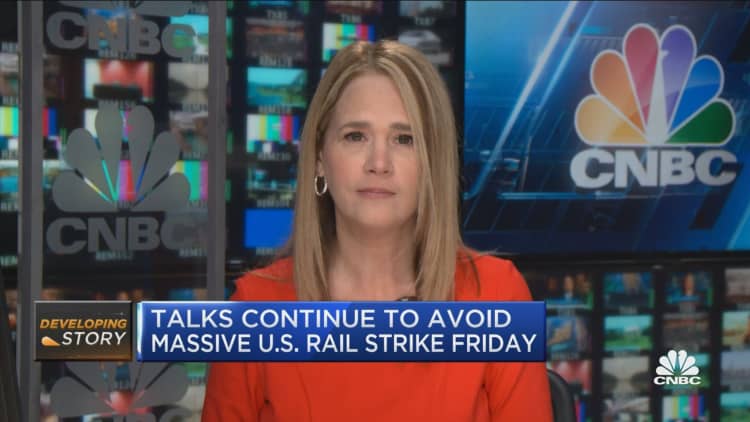Large railroad labor unions say they will strike if quality of life is not addressed in new contract
Railroad unions representing half of workers say they will strike unless vacation and sick days, and attendance policies, are addressed in new labor contract.


Two of the largest railroad unions in negotiations with railroad carriers have drawn a line in the sand: they are demanding more quality of life provisions are put into the contract, covering attendance policies, vacation and sick days, or they will strike.
Brotherhood of Locomotive Engineers and Trainmen and the SMART Transportation Division represent half of railroad union workers.
Eight out of the 12 unions have reached tentative agreements with the railroad carriers, according to the National Carriers' Conference Committee. They did not negotiate the quality of life provisions, sources familiar with the negotiations tell CNBC. The unions have what is called, "Me Too" agreements, which means whatever benefits the BLET and the SMART unions agree to in their contract with the carriers, other unions' members receive.
"If this contract is presented to our members in its current form, it will not pass," said a labor spokesperson to CNBC. "The workers are angry. They want movement on attendance policies and not be afraid to take a sick day or vacation day without the fear of termination. There will be no ratification unless this is addressed."
A railroad spokesperson told CNBC they would not comment on ongoing negotiations, but stressed, "The railroads remain in active discussions with the unions that have not yet reached tentative agreements and will continue making every effort to reach agreements based on the PEB recommendations."
In July, President Biden appointed a Presidential Emergency Board in hopes of averting a strike and making recommendations that rails and labor unions could agree on.
Attendance policies and staffing have been a point of contention over the last two years of this negotiation. Over 700 union workers quit after BNSF, a wholly owned subsidiary of Berkshire Hathaway, instituted a points-based attendance system in February. The system was revised in May but union workers say the modifications did not fix the safety issues calling it "brutal." Labor sources tell CNBC employees would be penalized for taking a day off to go to their parent's funeral.
The railroad has contended that the new policy is critical to making sure it has enough workers available for its trains. Rails have faced scrutiny for worsening service from unions, shippers and regulators.
A maintenance-of-way worker walks alongside a segment of newly laid railroad track on the Burlington Northern Santa Fe (BNSF) Railway Co. Southern Transcontinental line in Alva, Oklahoma, U.S., on Wednesday, Aug. 19, 2015.
Bloomberg | Bloomberg | Getty Images
"The railroad has brought its labor woes on itself," said a labor insider with knowledge of the negotiations. "They have made steep staffing cuts to appease shareholders and improve their bottom line. Workers are burned out. You have heard from the railroads they are hiring but they are not retaining talent because of the point system where you are on call for 12 hours a day and you have to be an hour or less away from your job. They are being held hostage."
While rails say they have been hiring aggressively amid the supply chain struggles, the U.S. Surface Transportation Board has reported the largest freight railroads in the U.S. have reduced their workforce by 29 percent in the last six years.
Around 40 percent of the nation's long-distance trade is moved by rail, more than any other form of transportation. If the unions strike, more than 7,000 trains would be idled and the rail industry has estimated it would cost the economy up to $2 billion per day.
The American Trucking Associations wrote a letter to Congress urging action — as have several other industry groups representing sectors including retail and agriculture — and noting that a current trucker shortage makes it difficult for the industry to handle more freight.
"Idling all 7,000 long distance daily freight trains in the U.S. would require more than 460,000 additional long-haul trucks every day, which is not possible based on equipment availability and an existing shortage of 80,000 drivers," said ATA President and CEO Chris Spear in the letter. "As such, any rail service disruption will create havoc in the supply chain and fuel inflationary pressures across the board."
Railroads begin emergency freight measures
Starting today, the railroads are securing and managing security-sensitive freight and hazmat cargo such as chlorine used by public water departments to purify drinking and chemicals used in fertilizers in the event of a strike. Norfolk Southern issued an alert to customers on the measures.
"We have communicated to our customers that we will temporarily halt certain types of shipments beginning September 12. In addition, to safely ramp down our network and enable us to bring service back quickly, certain other customers will see a preliminary curtailment of service before September 16."
The American Association of Railroads says the carriers are following federal regulations.
"Operational changes required to prepare for a safe, orderly suspension were delayed as long as possible," a railroad spokesman wrote in an email to CNBC. "With less than a week away from a potential service interruption, carriers are obligated to take appropriate actions to prepare, which include making plans for handling HAZMAT shipments, as well as other freight that may be impacted if service must be reduced or stopped. Notification to customers is an essential part of that contingency planning."
The spokesman added that railroads do not believe a national service interruption is inevitable, "but the time has arrived when certain customers will begin to be impacted if agreements are not reached."
A rail labor union spokesperson told CNBC, "The railroads cannot legally lock us out so they are resorting to the extortion of the shippers. Impacting the supply chain so the shippers will go to Congress demanding intervention. Congress must not cave."
Will Congress intervene?
The last time Congress intervened was in 1992 after the machinists union struck CSX in a dispute over a new labor contract. Then U.S. President George Herbert Walker Bush called on Congress to act quickly. President Bush signed the return to work bill after the two-day strike shut down nationwide railroad freight service.
"These self-appointed titans of industry complain constantly about government regulation and interference — except now when it comes to breaking the backs of their employees," the BLET, which is affiliated with the Teamsters, and the SMART Transportation Division said in a statement. "It's time for the federal government to tell the CEOs who are running the nation's railroads into the ground that enough is enough. Congress should stay out of the rail dispute and tell the railroads to do what other business leaders do — sit down and bargain a contract that your employees will accept."
CNBC was told by both the railroads and labor unions negotiations will continue Monday. The unions can strike on Friday.
Correction: Eight out of the 12 unions have reached tentative agreements with the railroad carriers, according to the National Carriers' Conference Committee.

 FrankLin
FrankLin 
































